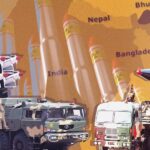Introduction:
As the India-Pakistan conflict intensifies in May 2025, the potential for a nuclear escalation grows. Could this be the first full-scale nuclear war between two nuclear-armed neighbors? In this article, we explore both nations’ nuclear doctrines, assess the likelihood of nuclear use, and examine the triggers that might lead to such an event.
The Current Situation
India and Pakistan are engaged in ongoing military confrontations, particularly over the disputed region of Kashmir. A recent escalation occurred on May 7, 2025, when India launched missile strikes targeting sites in Pakistan, which resulted in casualties and heightened tensions.

Explore the Impact of India’s Military Strategies
Nuclear Doctrines: A Tale of Two Policies
Both India and Pakistan have established distinct nuclear policies, designed to deter each other from nuclear conflict while maintaining the capability for retaliation. Understanding these policies is key to assessing the possibility of nuclear escalation.
- India’s Nuclear Doctrine: India follows a No First Use (NFU) policy, meaning it will only use nuclear weapons in retaliation if struck first by a nuclear attack. However, recent political statements have raised questions about a possible shift toward more ambiguity.
- Pakistan’s Nuclear Posture: Pakistan, on the other hand, has a more ambiguous policy and has developed tactical nuclear weapons (TNWs) intended for use in battlefield situations, potentially lowering the threshold for nuclear use.
Read more about India’s Nuclear Strategy on SIPRI
What Triggers a Nuclear Response?
The likelihood of nuclear escalation depends on various factors, including the military, territorial, and political thresholds in each country’s nuclear doctrine. Pakistan has specified that large-scale territorial loss, destruction of military forces, or significant political destabilization could trigger nuclear retaliation.
The Role of Tactical Nuclear Weapons
Both India and Pakistan have modernized their nuclear arsenals, with Pakistan deploying short-range tactical nuclear weapons designed for battlefield use. These weapons have the potential to escalate rapidly, even without a full-scale nuclear exchange.
Conclusion: Is Nuclear War Inevitable?
While it is improbable that nuclear weapons will be used, experts caution that strategic missteps and the fog of war could lead to an accidental escalation. The possibility of a nuclear conflict cannot be entirely ruled out, especially considering the close proximity of both nations’ military operations and their nuclear capabilities.
How the Geopolitical Situation in South Asia Could Affect Global Stability
Call to Action:
Stay informed on this critical issue as the geopolitical situation evolves. For updates and analysis, subscribe to our newsletter and explore related articles on the escalating tensions in South Asia.









